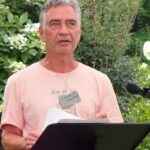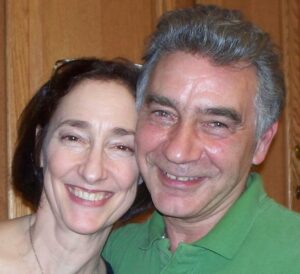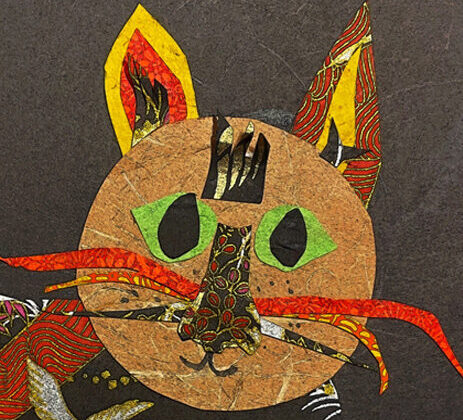Remembering Stuart Bartow

Barbara Ungar
Wandering Among the Stars
When I first met Stu, 22 years ago in a writing group (he was 50, but I took him for 30), he was already an accomplished and well-published lyric poet, a nature poet. We both wrote haiku in private, but didn’t publish it.
More than a decade later, I was tapped to be a judge for The Haiku Foundation’s Touchstone Book Awards, much to my surprise. By then, Stuart and I were a couple. We both reveled in the boxes of haikai books that arrived, and at the unsuspected breadth and depth of the contemporary haiku scene. He leapt into that scene, was warmly embraced, and felt he’d found his people. We both began to publish haiku—in Frogpond, Modern Haiku, Acorn, Akitsu Quarterly, bottle rockets, and many others. Stu published far more than I: he loved it so much that he rarely wrote longer lyrics anymore, and focused on haiku.
As Stu published and read more widely in the haiku world, he tried his hand at haibun and was an instant master. I believe haibun was the perfect form for him, combining his ability to write evocative haiku and startling, imaginative prose. Stu had the most wonderful imagination, which was the envy of our writing group. He loved Borgesian speculation about his many obsessions: stars, birds, fish, moths, insects, bats, bees, constellations, ships, the afterlife, prior lives, outer space, B movies, baseball, and myths, among others. These themes recur in all in his work. Stu wrote easily, naturally, “as the leaves come to the trees,” in Keats’ simile, and never forced it. Haibun gave him free rein to let his imagination wander among the stars, while also giving him homes for some of his best haiku.
Of the great Japanese poets, Issa was his favorite, and Stu was closest to him in temperament. Stu was the most generous and happy person I ever met, and the least materialistic. He was comfortable outdoors and lived simply, humbly, and close to nature in what was essentially a hunting and fishing cabin, heated with a wood stove. (He wanted to die in his beloved woods and have an aerial burial by raptor, but that was not to be.) Stu kept a wild garden and had a cat-door to the porch where he kept cat food—not only for his own three to four cats, but any hungry strays or feral cats in the neighborhood, as well as the occasional raccoon or skunk. He told me once how he’d gotten up in the night, found a skunk eating cat food on the porch, and very gently shooed it out. He was fearless. He had run his family’s exterminating company for years before returning to school to get his Doctor of Arts in poetry from SUNY Albany and becoming a Distinguished Professor of English at SUNY Adirondack, where he taught for 30 years; Stu was familiar and comfortable with bats, spiders, and all manner of rodents and insects that most people consider pests. He’d hated having to kill them unnecessarily. When I asked him once what to do about the sugar ants in my kitchen, he told me E. O. Wilson’s reply to a woman who had asked him the same question: “Pour a pile of sugar on the counter and watch what they do!”
This attitude is clear in many of his haibun. I can think of two particular favorites from Invisible Dictionary. In “Harriet and Me,” he befriends a spider in his bathroom and begins to bounce into her web flies that he’s captured. (Stu had been a superb athlete and still had great reflexes: like Obama, he could catch flies with one hand.) He writes, “I imagine these flies were like steaks for Harriet.” He knows she’ll die by fall, but decides to find and remove her egg sac to the woodshed for the winter; even Stu didn’t want “hundreds of spiderlings wandering about the house one morning.”
In my other favorite, “To Know,” Stu speculates about a spider he sees while out fishing:
The summer light dances in the stream below the web. And I wonder: concealed in a reed’s shadow, or a rock’s, clinging to a strand of her web, prone for the right vibration to alert her that she’s snared a catch, in her tiny brain, with her eight eyes, does she know that she dwells in such splendor?
nurses at the chemo center
discuss
killing spiders
Stu generally despised haikai about cancer and chemotherapy, but once he had been diagnosed with stage 4 metastatic liver cancer in June 2023, he couldn’t resist that one. When he got the bad word, his first goal was to finish editing his last collection of haiku, full moon radio, which he did in the fall. Next he enlarged Invisible Dictionary, adding thirty-some haibun to an already rich collection. Afterwards, he wondered whether he shouldn’t simply have put out a second, new collection of haibun, fretting (for a moment or two) about whether people would buy the enlarged edition. But Stu never worried for long. He was happy to the end, surrounded by people he loved who had the opportunity to tell and show him how much they loved him. He actually told me at some point during those last seven months that he was happier than he’d ever been, except for when we first got together.
In our last conversation, he said, “Haiku has illuminated my life.” We both loved Japanese Death Poems and discussed our own many times, and the circumstances under which we would write them. His death poem came when he first drove himself to the Glens Falls, New York, Emergency Room in the wee hours, through rolling hills and fog, and arrived at the beginning of his final adventure:
journey to the underworld
the doors open
automatically
About the Author

Barbara Ungar is the author of Haiku in English (Stanford Humanities Honors Essay, 1978) as well as nine volumes of longer poems, most recently After Naming the Animals (The Word Works, 2024). She has published haibun in Drifting Sands Haibun and Haibun Today, and haiku in Modern Haiku, Frogpond, Acorn, Akitsu Quarterly, Wales Haiku Journal, and others. www.barbaraungar.net
Photo by Jeanne Wiley
